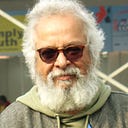Bangalore Diary-4
“Better you advise drivers to get technology-friendly because the driver cabin would be sporting more monitoring systems soon to improve the safety of cargo, vehicle, and of course drivers. That is the only way fleet owners will reap productivity gains, satisfy clients of timely and safe delivery of consignment, and above all, help improve remuneration for drivers,” said Pariskq IOT Solutions promoter Sudhir Gopalakrishna seated in his Basavangudi office, a few meters from Bengaluru’s historic landmark, the Lalbaug gardens on a December morning.
Sudhir’s advice is nothing new. Asking me to sensitize long-haul truck drivers to get comfortable with technology has been in vogue for several years. The decibel level of such advice multiplied after the BS6 launch.
I upped my decibel to truck drivers to “embrace” technology willingly and try to help them “migrate from tech phobia to tech friendliness, besides my regular quota of advisory on road safety, hygiene/sanitation, personal finance, etc.
A decade ago, GPS put drivers off, citing subtly invasion of privacy without using such flung phrases. But the message was clear.
Load over. Trip advance received. Delivery schedule announced. Then why the hell is all this ‘micromanaging through GPS’? Shippers have won them over by tightening ‘no GPS, no loads’ norms to transporters, who convinced drivers to accept GPS for all-around safety.
Then came the BS6 and the ADAS/DMS. Another tech assault on the gullible and the underprivileged truck drivers. Why, again? They are perplexed.
It is a battle of wits between fleet owners and their men at the wheels.
Hearing Sudhir, it is perceptible that the engagement is gaining currency and acceptance. More fleet owners can get the buy-in of their drivers. Right, ITS Jasveer Singh?
The Global Positioning System (GPS) acted as a fevicol to unite me with Sudhir. It has been a decade-long association.
Despite the presence of the big global boys of navigation like Trimble and others, Sudhir had his share of business in the Indian market intact then and now, though today’s players are different.
Sudhir points out that the stage when even Tom, Dick, and Harry used to import Chinese gadgets and dump on gullible clients that era is over. “Now, the demand is for end-to-end solutions. Not hardware selling,” informs Pariskq’s boss. Only serious and enterprising solution providers survive, says Sudhir.
Fleet asset management, particularly in the domains of chemicals, cash delivery, jewelry, automotive, and ODC, is Pariskq’s forte.
Supply chain visibility has graduated into a new animal. A welcome step.
